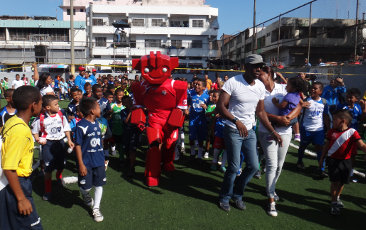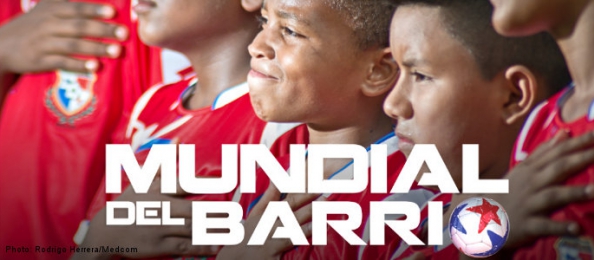Mundial del Barrio
In 1997, after his social reinstatement, community leader Hector Brands decided to start a summer soccer league in the small town of San Felipe. The league comprised four teams with 70 kids from that area. The purpose of the league was to try to occupy the participants’ spare time during the summer and to keep them from violence and the use of drugs present in that area of the city. It was through soccer that the children and young adults started learning about peaceful coexistence, tolerance, and the benefits of living without violence.
Because of this league, there was a movement started that became well respected by civil society. Today, Movimiento Nueva Generación – MNG (New Generation Movement) is a nongovernmental organization that handles the project called Neighborhood World Cup in its entirety. The main objective of this project is to develop activities under an overall scope of prevention that are geared toward children and adolescents living in socially vulnerable and violent environments. It also highlights moral and ethical values, including the International Children’s Rights Law, and contributes to society with the education of future community leaders for a peaceful culture.
In 2013, there were 49,060 crimes and misdemeanors of all types that were reported in Panama for the year 2012, according to the National Integrated System of Criminal Statistics, which belongs to the Office of Public Security. Furthermore, other studies presented by this office have shown a direct correlation between delinquency and population density, which means there is more crime in urban areas such as San Felipe, which is a small municipality adjacent to the metropolis that Panama City has now become. There are many communities similar to San Felipe in which kids are more likely to follow a violent pattern of living due to population densities and poverty levels.
For more than 10 years, the soccer league, previously called Summer Cup, kept expanding in San Felipe as an inter-neighborhood league. It was installed two years after its creation in the popular neighborhood of El Chorrillo, which became famous after being almost wiped out by the tragic bombings of the United States during Operation Just Cause in 1989 before being reconstructed by subsequent administrations after the Manuel Noriega dictatorship. In 2007 Hector Brands presented the project to the UNICEF Panama director at that time, who agreed to be a sponsor for three consecutive years, calling it then “UNICEF Cup.” That same year, more neighborhoods were included, such as Santa Ana and Curundu, which are still socially vulnerable places. In 2009 the “UNICEF Cup” had around 3,000 participants. In 2010 Medcom engaged with UNICEF to create a bigger inter-neighborhood league, expanding it to other provinces, changing its name to what it is now, Neighborhood World Cup, and bringing it to the national level, with participation by 4,500 kids in its first season.
| Initiator | Hector Brands |
| Project start | 1997 |
| Status | ongoing |
| Region | Panama |
| Contact person | Lilines Urriola Herrera |
| Awards |
Project benefit
- Crime prevention
- Sports activities for Children
- Strengthen neighborhood-communities
| Anti-Corruption | - |
| Business & Peace | - |
| Development | - |
| Environment | - |
| Financial Markets | - |
| Implementing UNGC Principles in your Corporate CSR Management | - |
| Human Rights | X |
| Labour Standards | - |
| Local Networks | - |
| Advocacy of global issues | - |
| Business opportunities in low income communities/countries | - |
| Project funding | X |
| Provision of goods | - |
| Provision of services/personal | X |
| Standards and guidelines development | - |
As Medcom became the main organizer along with MNG, the project has been featured on national television by station RPCTV, which broadcasts news and sports. Medcom is a multimedia corporation composed of five television networks (two broadcasted nationally and three broadcasted by cable), two radio stations – including the first radio station in the country – as well as the most important internet platform in Panama: telemetro.com. The alliance of both entities allowed for the inclusion of new sponsors, which made possible to transmit the games nationally. This served as an important motivator for the kids to stay in the league, which has strict rules, specifically regarding discipline and attendance.
The Neighborhood World Cup is the only league in the country that is free for all the participants. In 2011 there were 5,070 boys and girls participating, from which 3,000 were granted scholarships by the Institute for the Education and Use of Human Resources, a government agency.

Aligned with Medcom’s corporate social responsibility strategy, this project adheres to the principles included in the Declaration of the Rights of the Child regarding the areas of health, the use of spare time, and protection – it is all linked to the sporting activities, instruction of values, and the prevention of drugs and violence. Currently, and ever since UNICEF assumed the project, the Neighborhood World Cup has linked football with the teaching and practice of values. It trains team directors and the children on topics such as leadership, self-esteem, children’s rights, family values, drugs and violence, communication, and teamwork. In 2011 there were a total of 576 hours of formal training, with 15-minute preparatory lessons before each game. For the last two years, the project has had record-breaking participation all across the country: 5,834 beneficiaries in 2012 and 6,900 in 2013.
As in many other countries, soccer is the most popular sport in Panama and attracts a great number of fans. Because of its influence on the people, Panama’s national team and professional soccer club players have become role models for the children, primarily in low-income communities. In the 16 years since the project’s inception, some of the program’s graduates have become players on the national teams in the professional leagues. This project has become the largest soccer school in the country – not only because of the teaching of soccer, but also because of the education as a whole, and the hope is that it will be sustained for many more years.
The soccer school’s primary objective has always been to prevent violence and to provide its participants with a better future, both personally and socially. Each game that is broadcast also features an individual case that takes into consideration the outstanding participation of one player. The case is chosen by evaluating all the team players, not only their social backgrounds and outstanding sporting skills, but also their personal development regarding values and economic needs. In recognition of the efforts of the chosen player, a sponsor is selected and offers a financial contribution for the player and his or her family.
This project description was originally presented in the Global Compact International Yearbook 2013.
Medcom is a media corporation in Panama. It owns several TV and Radio channels in Panama.
Write a comment about this page
Your comments are provided by your own free will and you take sole responsibility for any direct or indirect liability. In order to maintain the highest discussion quality, all comments will be reviewed by our editors. You hereby provide us with an irrevocable, unlimited, and global license for no consideration to use, reuse, delete or publish comments in accordance with our Community Guidelines.
About Us // Privacy Policy // Copyright Information // Legal Disclaimer // Contact
Copyright © 2012-2018 macondo publishing GmbH. All rights reserved.
The CSR Academy is an independent learning platform of the macondo publishing group.









